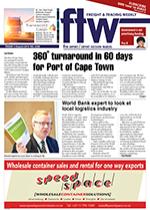The independent FairPlay movement – established two years ago to “end the scourge of dumping as an immoral trade practice” – has called for a public inquiry into the decision taken by government last year to implement zero tariff on sugar imports into South Africa. The move allowed importers to bring in and stockpile massive sugar stocks, which “plunged the South African industry into a crisis”. “This is more than an administrative error. It was a brief period, but taken together with months when tariffs were kept low, it brought about a huge surge in sugar imports in 2017,” said Francois Baird, founder of the FairPlay movement. He added that it had resulted in a “disaster” for the sugar industry, costing the country millions if not billions of rand in import revenue. Since then, the South African Sugar Association has applied to the International Trade Administration Commission for a 51% increase in the sugar tariff to protect the industry from cheap imports. Meanwhile a spokesperson for the Department of Trade and Industry reportedly assured sugar producers and millers at a recent protest march that the relevant departments were addressing the issue and would resolve tariff insufficiency by the end of July. But Baird has his doubts. “One can only hope that these are not empty promises. At this stage simply correcting the tariffs may not be enough, although it will be a start,” he commented, highlighting that the government’s self-imposed deadline was looming. Rex Talmage, vice-chairperson of the South African Cane Growers’ Association, said several factors compounded the challenges facing the local industry. These include two prolonged droughts in the past decade, the introduction of a sugar tax on April 1, demand for sugar, imported sugar being allowed to flow into the country “duty free” for several weeks this year, and misinformation on transformation successes. “The biggest challenge, however, remains the failure of the South African government to declare a dollar-based reference price and establish the level of protection required through an import tariff against the impact of low-cost imported sugar being dumped on the local market.” He said that the process for calculating and triggering the sugar tariff in South Africa was a “straightforward empirical calculation”. “This is based on the 20-day moving average of the global price of sugar as established by the daily settlement price for sugar on the London commodity exchange. If there is a difference of more than $20 per tonne between the London settlement price and South Africa’s Dollar Based Reference Price based on the 20-day moving average, a new tariff rate is triggered,” added Baird. The South African sugar industry generated an annual estimated average direct income of over R12bn and the businesses of the 24 000 producers – especially small-scale growers and beneficiaries under the South African Cane Growers’ Association’s myriad transformation and land reform projects – were under serious threat, said Talmage. “Having been given all the relevant information, can the government and the International Trade Administration Commission afford to preside over delays in fixing the tariff crisis and provide this industry with the lifeline it needs to survive?”
INSERT
At this stage simply correcting the tariffs may not be enough.

